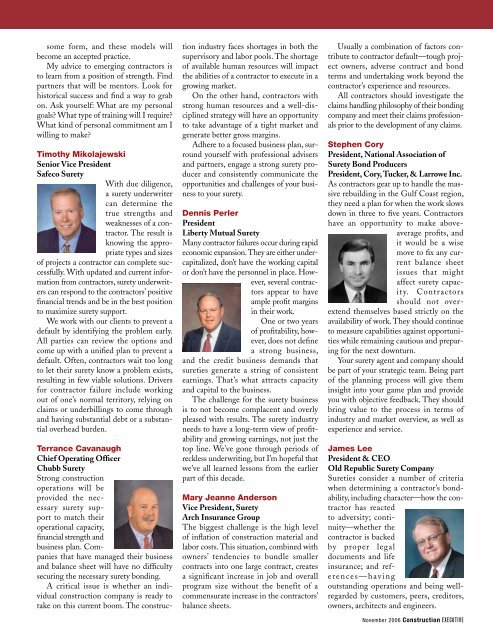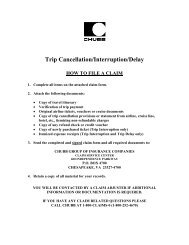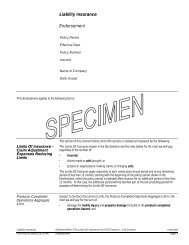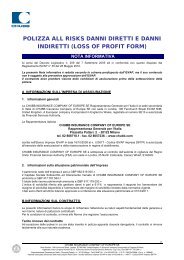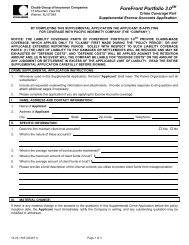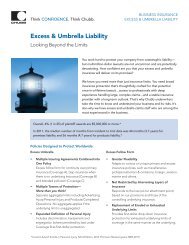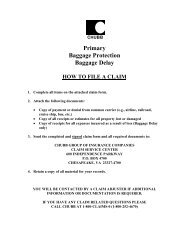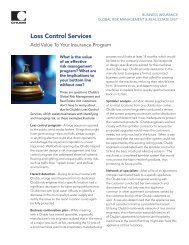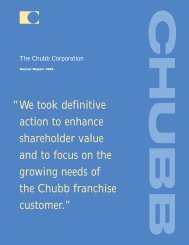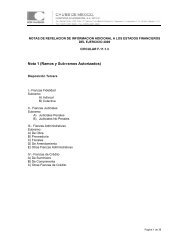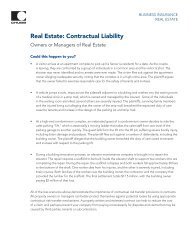Surety - Chubb Group of Insurance Companies
Surety - Chubb Group of Insurance Companies
Surety - Chubb Group of Insurance Companies
You also want an ePaper? Increase the reach of your titles
YUMPU automatically turns print PDFs into web optimized ePapers that Google loves.
some form, and these models will<br />
become an accepted practice.<br />
My advice to emerging contractors is<br />
to learn from a position <strong>of</strong> strength. Find<br />
partners that will be mentors. Look for<br />
historical success and find a way to grab<br />
on. Ask yourself: What are my personal<br />
goals? What type <strong>of</strong> training will I require?<br />
What kind <strong>of</strong> personal commitment am I<br />
willing to make?<br />
Timothy Mikolajewski<br />
Senior Vice President<br />
Safeco <strong>Surety</strong><br />
With due diligence,<br />
a surety underwriter<br />
can determine the<br />
true strengths and<br />
weaknesses <strong>of</strong> a contractor.<br />
The result is<br />
knowing the appropriate<br />
types and sizes<br />
<strong>of</strong> projects a contractor can complete successfully.<br />
With updated and current information<br />
from contractors, surety underwriters<br />
can respond to the contractors’ positive<br />
financial trends and be in the best position<br />
to maximize surety support.<br />
We work with our clients to prevent a<br />
default by identifying the problem early.<br />
All parties can review the options and<br />
come up with a unified plan to prevent a<br />
default. Often, contractors wait too long<br />
to let their surety know a problem exists,<br />
resulting in few viable solutions. Drivers<br />
for contractor failure include working<br />
out <strong>of</strong> one’s normal territory, relying on<br />
claims or underbillings to come through<br />
and having substantial debt or a substantial<br />
overhead burden.<br />
Terrance Cavanaugh<br />
Chief Operating Officer<br />
<strong>Chubb</strong> <strong>Surety</strong><br />
Strong construction<br />
operations will be<br />
provided the necessary<br />
surety support<br />
to match their<br />
operational capacity,<br />
financial strength and<br />
business plan. <strong>Companies</strong><br />
that have managed their business<br />
and balance sheet will have no difficulty<br />
securing the necessary surety bonding.<br />
A critical issue is whether an individual<br />
construction company is ready to<br />
take on this current boom. The construction<br />
industry faces shortages in both the<br />
supervisory and labor pools. The shortage<br />
<strong>of</strong> available human resources will impact<br />
the abilities <strong>of</strong> a contractor to execute in a<br />
growing market.<br />
On the other hand, contractors with<br />
strong human resources and a well-disciplined<br />
strategy will have an opportunity<br />
to take advantage <strong>of</strong> a tight market and<br />
generate better gross margins.<br />
Adhere to a focused business plan, surround<br />
yourself with pr<strong>of</strong>essional advisers<br />
and partners, engage a strong surety producer<br />
and consistently communicate the<br />
opportunities and challenges <strong>of</strong> your business<br />
to your surety.<br />
Dennis Perler<br />
President<br />
Liberty Mutual <strong>Surety</strong><br />
Many contractor failures occur during rapid<br />
economic expansion. They are either undercapitalized,<br />
don’t have the working capital<br />
or don’t have the personnel in place. However,<br />
several contractors<br />
appear to have<br />
ample pr<strong>of</strong>it margins<br />
in their work.<br />
One or two years<br />
<strong>of</strong> pr<strong>of</strong>itability, however,<br />
does not define<br />
a strong business,<br />
and the credit business demands that<br />
sureties generate a string <strong>of</strong> consistent<br />
earnings. That’s what attracts capacity<br />
and capital to the business.<br />
The challenge for the surety business<br />
is to not become complacent and overly<br />
pleased with results. The surety industry<br />
needs to have a long-term view <strong>of</strong> pr<strong>of</strong>itability<br />
and growing earnings, not just the<br />
top line. We’ve gone through periods <strong>of</strong><br />
reckless underwriting, but I’m hopeful that<br />
we’ve all learned lessons from the earlier<br />
part <strong>of</strong> this decade.<br />
Mary Jeanne Anderson<br />
Vice President, <strong>Surety</strong><br />
Arch <strong>Insurance</strong> <strong>Group</strong><br />
The biggest challenge is the high level<br />
<strong>of</strong> inflation <strong>of</strong> construction material and<br />
labor costs. This situation, combined with<br />
owners’ tendencies to bundle smaller<br />
contracts into one large contract, creates<br />
a significant increase in job and overall<br />
program size without the benefit <strong>of</strong> a<br />
commensurate increase in the contractors’<br />
balance sheets.<br />
Usually a combination <strong>of</strong> factors contribute<br />
to contractor default—tough project<br />
owners, adverse contract and bond<br />
terms and undertaking work beyond the<br />
contractor’s experience and resources.<br />
All contractors should investigate the<br />
claims handling philosophy <strong>of</strong> their bonding<br />
company and meet their claims pr<strong>of</strong>essionals<br />
prior to the development <strong>of</strong> any claims.<br />
Stephen Cory<br />
President, National Association <strong>of</strong><br />
<strong>Surety</strong> Bond Producers<br />
President, Cory, Tucker, & Larrowe Inc.<br />
As contractors gear up to handle the massive<br />
rebuilding in the Gulf Coast region,<br />
they need a plan for when the work slows<br />
down in three to five years. Contractors<br />
have an opportunity to make aboveaverage<br />
pr<strong>of</strong>its, and<br />
it would be a wise<br />
move to fix any current<br />
balance sheet<br />
issues that might<br />
affect surety capacity.<br />
Contractors<br />
should not overextend<br />
themselves based strictly on the<br />
availability <strong>of</strong> work. They should continue<br />
to measure capabilities against opportunities<br />
while remaining cautious and preparing<br />
for the next downturn.<br />
Your surety agent and company should<br />
be part <strong>of</strong> your strategic team. Being part<br />
<strong>of</strong> the planning process will give them<br />
insight into your game plan and provide<br />
you with objective feedback. They should<br />
bring value to the process in terms <strong>of</strong><br />
industry and market overview, as well as<br />
experience and service.<br />
James Lee<br />
President & CEO<br />
Old Republic <strong>Surety</strong> Company<br />
Sureties consider a number <strong>of</strong> criteria<br />
when determining a contractor’s bondability,<br />
including character—how the contractor<br />
has reacted<br />
to adversity; continuity—whether<br />
the<br />
contractor is backed<br />
by proper legal<br />
documents and life<br />
insurance; and references—having<br />
outstanding operations and being wellregarded<br />
by customers, peers, creditors,<br />
owners, architects and engineers.<br />
November 2006 Construction Executive


